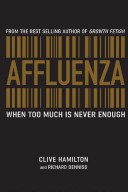 W
WAffluenza: When Too Much is Never Enough is a book written by Professor Clive Hamilton and Richard Denniss, and was published in 2005. According to the book, Western society is addicted to overconsumption and this situation is unique in human history. Hamilton and Denniss argue that overconsumption is driven by aspiration, in an effort to emulate the lifestyles of the rich and the famous through the identities and fulfilments that commodities are supposed to, but do not necessarily, deliver. Rates of stress, depression and obesity are high as people try to cope with the emptiness and disappointments of consumer life.
 W
WAftermath: On Marriage and Separation is a 2012 divorce memoir by Rachel Cusk dealing with her marriage and divorce from her husband Adrian Clarke. It follows two earlier memoirs, one related to their children: A Life's Work: On Becoming a Mother.
 W
WThe Americans: The Democratic Experience is a 1973 book by American historian Daniel J. Boorstin. The book is the third in his American history trilogy, in which he argues that the physical environment of the New World shaped American society.
 W
WAssholes: A Theory is a 2012 non-fiction book by Aaron James. An associate professor of philosophy at the University of California, Irvine, James attempts a precise academic definition of the term. According to James, an asshole "allows himself to enjoy special advantages in social relations out of an entrenched sense of entitlement that immunizes him against the complaints of other people." As Martin Patriquin writes in Maclean's, the author "spends 214 quite convincing pages arguing that “assholeness” is less inattention than a permanent state of mind [...]" Seekers of philosophical meaning will find much to ponder with James, concludes Alex Balk in Slate.
 W
WBaba of Karo is a 1954 book by the anthropologist Mary F. Smith. The book is an anthropological record of the Hausa people, partly compiled from an oral account given by Baba (1877-1951), the daughter of a Hausa farmer and Koranic teacher. Baba's reports were translated by Smith.
 W
WThe Book of Murder was a piece of anti-Poor Law propaganda presented as the work of one pseudonymous "Marcus", originally published in Britain during the 1830s by Joshua Hobson. It aimed to incite opposition to the Poor Law Amendment Act 1834, claiming that Poor Law commissioners were intent on using infanticide to control the explosion in the population of the poor, which had been a fear of the working class since the adoption of the 1834 legislation.
 W
WThe Botany of Desire: A Plant's-Eye View of the World is a 2001 nonfiction book by journalist Michael Pollan. Pollan presents case studies that mirror four types of human desires that are reflected in the way that we selectively grow, breed, and genetically engineer our plants. The tulip, beauty; marijuana, intoxication; the apple, sweetness; and the potato, control.
 W
WThe Bugis is a book written by Christian Pelras about the Bugis people produced in 1996 and published in the United States in 1997 by Blackwell Publishing. It is the first book ever to describe the history of the Bugis ranging from their origins 40,000 years ago to the present. The book is one of the books under The Peoples of South-East Asia and the Pacific book series.
 W
WThe Cambridge Dictionary of Sociology is a dictionary of sociological terms published by Cambridge University Press and edited by Bryan S. Turner. There has only been one edition so far. The Board of Editorial Advisors is made up of: Bryan S. Turner, Ira Cohen, Jeff Manza, Gianfranco Poggi, Beth Schneider, Susan Silbey, and Carol Smart. In addition there are nearly 100 other contributors.
 W
WCelebrating The Third Place, subtitled: Inspiring Stories About The Great Good Places at the Heart of Our Communities, is a 2001 book by Ray Oldenburg. The book is a collage of 19 essays which tell stories of active third places in the heart of communities.
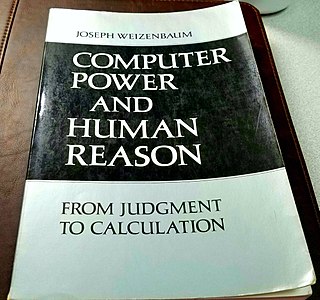 W
WComputer Power and Human Reason: From Judgment to Calculation (1976) by Joseph Weizenbaum displays the author's ambivalence towards computer technology and lays out the case that while artificial intelligence may be possible, we should never allow computers to make important decisions because computers will always lack human qualities such as compassion and wisdom. Weizenbaum makes the crucial distinction between deciding and choosing. Deciding is a computational activity, something that can ultimately be programmed. It is the capacity to choose that ultimately makes us human. Choice, however, is the product of judgment, not calculation. Comprehensive human judgment is able to include non-mathematical factors such as emotions. Judgment can compare apples and oranges, and can do so without quantifying each fruit type and then reductively quantifying each to factors necessary for mathematical comparison.
 W
WConference of the Birds: The Story of Peter Brook in Africa is a biographical book by John Heilpern, in which he describes a journey by theatre director Peter Brook and a group of actors, including Helen Mirren, across the Sahara in Northwest Africa.
 W
WThe Craftsman is a book by Richard Sennett about his work as a social critic and the relationship between making and thinking.
 W
WCultures of Vision is a 1995 book by Ron Burnett, in which the author explores the relationship between visual cultures and popular culture. It was published by the Indiana University Press.
 W
WCyberia is a book by Douglas Rushkoff, published in 1994. The book discusses many different ideas revolving around technology, drugs and subcultures. Rushkoff takes a Tom Wolfe Electric Kool-Aid Acid Test style, as he actively becomes a part of the people and culture that he is writing about. The book goes with Rushkoff as he discusses topics ranging from online culture, the concept of a global brain as put forth in Gaia theory, and Neoshamanism.
 W
WDans l'enfer des tournantes is a book by French activist Samira Bellil.
 W
WDeath, Desire and Loss in Western Culture is a 1998 philosophy book by the social theorist Jonathan Dollimore. The book describes the influence of the death obsession in western culture. Dollimore's analysis is heavily influenced by early modern culture.
 W
WEvicted: Poverty and Profit in the American City is a 2016 non-fiction book by the American author Matthew Desmond. Set in the poorest areas of Milwaukee, Wisconsin, the book follows eight families struggling to pay rent to their landlords during the financial crisis of 2007–2008. It highlights the issues of extreme poverty, affordable housing, and economic exploitation in the United States. Desmond advocates for a universal housing voucher program from the U.S. government for families below a certain income threshold so that they pay no more than 30 percent of their income on housing.
 W
WThe Facebook Effect: The Inside Story of the Company That Is Connecting the World is a book by David Kirkpatrick and published by Simon & Schuster. It describes the history of Facebook and its social implications.
 W
WFeminist Theory: From Margin to Center is a 1984 book about feminist theory by bell hooks. The book confirmed her importance as a leader in radical feminist thought. The "margin" in the title refers to Hooks' description of black women as existing on the margins and their lives hidden from mainstream American society as well as not being part of mainstream feminist theory. The book was published in French in 2017.
 W
WThe Great Good Place is a book by Ray Oldenburg, originally published in 1989. More recent reprints have occurred in 1997 and 1999. While "Cafes, Coffee Shops, Community Centers, General Stores, Bars, Hangouts, and How They Get You through the Day" was the original subtitle, the more recent reprints of this work use the new subtitle "Cafés, Coffee Shops, Bookstores, Bars, Hair Salons and Other Hangouts at the Heart of a Community."
 W
WGuyland: The Perilous World Where Boys Become Men (ISBN 978-0-06-083134-9) is a book by Michael Kimmel, published in 2008. The book covers the culture for young men transitioning from adolescence to adulthood.
 W
WInequality Reexamined is a 1992 book by the economist Amartya Sen. In the book Sen evaluates the different perspectives of the general notion of inequality, focusing mainly on his well-known capability approach. The author argues that inequality is a central notion to every social theory that has stood on time. For only if this basic feature is satisfied can a social theory which advocates a set of social arrangements be plausible. Taken the inequality ingredient for granted, the crucial question becomes: inequality of what? Sen answers this basic question by advocating his preferred notion of equality which is based on the capability for Functions.
 W
WLegitimation Crisis is a 1973 book by the philosopher Jürgen Habermas. It was published in English in 1975 by Beacon Press, translated and with an introduction by Thomas McCarthy. It was originally published by Suhrkamp. The title refers to a decline in the confidence of administrative functions, institutions, or leadership: a legitimation crisis.
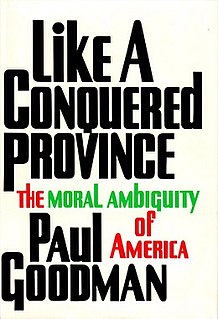 W
WLike a Conquered Province: The Moral Ambiguity of America is a book of Paul Goodman's Massey Lectures for the Canadian Broadcasting Corporation on topics of American pathologies, in particular, citizens not taking responsibility for the consequences of inequality and harmful technologies. He advocates for decentralized alternatives to existing institutions that give greater control to individuals.
 W
WThe Managed Heart: Commercialization of Human Feeling, by Arlie Russell Hochschild, was first published in 1983. A 20th Anniversary edition with a new afterword added by the author was published in 2003. It was reissued in 2012 with a new preface. It has been translated into German, Chinese, Japanese, Polish, and French. Hochschild's text is seminal and scholars like Sarah J. Tracy and Stephen Fineman have expanded on her concept of emotional labor.
 W
WThe McDonaldization of Society is a 1993 book by sociologist George Ritzer. Ritzer suggests that in the later part of the 20th century the socially-structured form of the fast-food restaurant has become the organizational force representing and extending the process of rationalization into the realm of everyday interaction and individual identity. McDonald's of the 1990s serves as the case model. The book introduced the term McDonaldization to learned discourse as a way to describe a social process which produces "mind-numbing sameness", according to a 2002 review of a related academic text.
 W
WMyths to Live By is a 1972 book, a collection of essays, originally given as lectures at the Cooper Union Forum, by mythologist Joseph Campbell between 1958 and 1971. The work has an introduction by Johnson E. Fairchild.
 W
WNew Keywords: A Revised Vocabulary of Culture and Society is a book edited by Tony Bennett, Lawrence Grossberg and Meaghan Morris and published in 2005 by Blackwell Publishing. It is an attempt to revise Raymond Williams' seminal 1976 text, Keywords: A Vocabulary of Culture and Society.
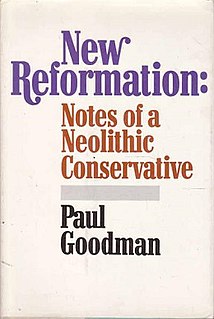 W
WNew Reformation: Notes of a Neolithic Conservative is a 1970 book of social commentary by Paul Goodman best known as his apologia pro vita sua before his death two years later.
 W
WNo Two Alike: Human Nature and Human Individuality is a book by psychology researcher Judith Rich Harris. It was published in February 2006. Harris attempts to explain why people are so different in personality, even identical twins who grow up in the same home.
 W
WOn Paradise Drive is the second book written by conservative New York Times commentator David Brooks, released four years after his first book, Bobos in Paradise. Using a similar style, his second work seeks to make a connection between the oft-maligned material strivings of middle-class Americans and a more profound focus on one's future, which he believes to be deeply ingrained in American society.
 W
WThe Plug-In Drug: Television, Children, And The Family is a book of social criticism written by Marie Winn and published in 1977 by Viking Press. In it, Winn brought the communications medium of television under withering fire, accusing it of wielding an addictive influence on the very young.
 W
WPostmodernity and Its Discontents is a book written by Zygmunt Bauman, published in 1997. It is considered a landmark in Bauman's studies on postmodernism.(subscription required)(subscription required) The title references Sigmund Freud's 1930 book Civilization and Its Discontents.
 W
WPublic Relations is a sociology book written by American pioneer in the field of public relations and propaganda, Edward Bernays, and first published in 1945.
 W
WRace Matters is a social sciences book by Cornel West. The book was first published on April 1, 1993 by Beacon Press. The book analyzes moral authority and racial debates concerning skin color in the United States. The book questions matters of economics and politics, as well as ethical issues and spirituality, and also addresses the crisis in black American leadership.
 W
WRacism without Racists: Color-Blind Racism and the Persistence of Racial Inequality in the United States is a book about color-blind racism in the United States by Eduardo Bonilla-Silva, a sociology professor at Duke University. It was originally published by Rowman & Littlefield in 2003, and has since been re-published four times, most recently in June 2017. The fourth edition was published soon after Barack Obama's election, and includes a new chapter on what Bonilla-Silva calls "the new racism". It was reviewed favorably in Science & Society, Urban Education, and Educational Studies.
 W
WSignifying Rappers: Rap and Race in the Urban Present is a nonfiction book by Mark Costello and David Foster Wallace. The book explores this music's history as it intersects with historical events, either locally and unique to Boston, or in larger cultural or historical contexts.
 W
WSissyphobia: Gay Men and Effeminate Behavior is a book by gay author Tim Bergling, published in 2001, that investigates why some gay men are more masculine than others and why society finds effeminate men objectionable. The neologism sissyphobia designates the fear or hatred of effeminate men, pejoratively called sissies.
 W
WSmart Mobs: The Next Social Revolution is a book by Howard Rheingold dealing with the social, economic and political changes implicated by developing technology. The book covers subjects from text-messaging culture to wireless Internet developments to the impact of the web on the marketplace. The author highlights the many ways in which technology alters and impacts the way in which people live and think.
 W
WSocial Theory and Social Structure (STSS) was a landmark publication in sociology by Robert K. Merton. It has been translated into close to 20 languages and is one of the most frequently cited texts in social sciences. It was first published in 1949, although revised editions of 1957 and 1968 are often cited. In 1998 the International Sociological Association listed this work as the third most important sociological book of the 20th century.
 W
WStatus Anxiety is a nonfiction book by Alain de Botton. It was first published in 2004 by Hamish Hamilton; subsequent publications have been by Penguin Books.
 W
WThe Technological Society is a book on the subject of technique by French philosopher, theologian and sociologist Jacques Ellul. Originally published in French in 1954, it was translated into English in 1964.
 W
WThat's Not What I Meant! How Conversational Style Makes or Breaks Relationships is Deborah Tannen's first book presenting, for a general audience, her linguistic approach to explaining how ways of speaking affect relationships. Predating by four years her phenomenally bestselling book about gender differences in ways of speaking, You Just Don't Understand, this short book approaches communication and miscommunication from a linguistic point of view rather than a psychological one, emphasizing differences between the genders. This book lays out the linguistic devices and rituals that constitute "conversational style," such as indirectness, pacing and pausing, humor, overlap and interruption, and shows their effects when styles differ.
 W
WThe Truly Disadvantaged: The Inner City, the Underclass, and Public Policy is a book by William Julius Wilson. The book was first published in 1987; a second edition was published in 2012. It examines the relationship between race and poverty in the United States, and the history of American inner-city ghettos. The broad-ranging book rejects both conservative and liberal arguments for the social conditions in American inner cities. In it, Wilson argues that the decline of such conditions is due to "basic economic changes which radically altered the occupational structure of the central cities," such as the withdrawal of large industries from inner cities during the 1970s. He also criticizes the architects of the War on Poverty during the 1960s, saying that they focused too much on poverty as a problem of environment rather than as a problem of "economic organization".
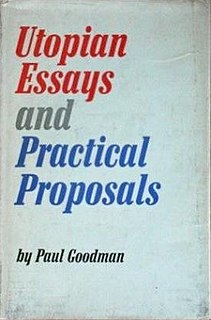 W
WUtopian Essays and Practical Proposals is a 1962 book of essays on social issues by Paul Goodman.
 W
WWhen to Rob a Bank: ...And 131 More Warped Suggestions and Well-Intended Rants is an edited collection of blog posts by American authors Steven Levitt and Stephen J. Dubner, authors of the Freakonomics series. It was published by HarperCollins imprint William Morrow on May 5, 2015.
 W
WWhite Collar: The American Middle Classes is a study of the American middle class by the sociologist C. Wright Mills, first published in 1951. It describes the forming of a "new class": the white-collar workers. It is also a major study of social alienation in the modern world of advanced capitalism, where cities are dominated by "salesmanship mentality". The issues in this book were close to Mills' own background, his father was an insurance agent and he himself, at that time, worked as a white-collar research worker in a bureaucratic organization, at Paul Lazarsfeld's Bureau for Social Research at Columbia University. From this point of view, it is probably Mills' most private book. The familiarity with the studied object as a lived matter refers with no doubt to Mills himself and his own experiences.